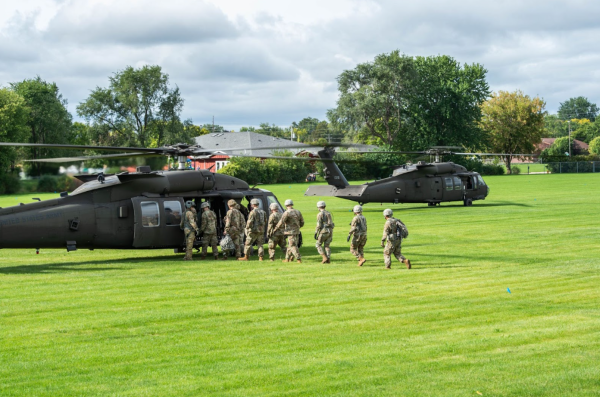UWO police to change overdose procedures after opioid epidemic
The opioid epidemic has caused UW Oshkosh campus police to make subtle changes in their procedures as well as acquire a supply of an overdose reversal drug.
UWO is part of a nine campus partnership with Adapt Pharma Inc., which supplies the schools with the Naloxone, otherwise known as Narcan, a nasal spray used to bring individuals back from an overdose.
Captain of the UWO Police Department Chris Tarmann said the University receives the doses from the Aids Resource Center which in turn obtains the drug from Adapt.
“After our email I actually went up front and looked at the Narcan that we have and it is Adapt Pharma, but we got that through the AIDS Resource Center in the Fox Valley and they donated that to us,” Tarmann said. “I don’t know the whole backstory behind that.”
Tarmann said the school receives four boxes of the nasal spray, which each contain two doses, for the entire year. Any additional doses they need UWOPD can pick up from a pharmacy in Omro.
“We’ve had it for about a year,” Tarmann said. “Our supply lasts for two years and then we have to get new stuff. We haven’t had to restock yet, no.”
Tarmann said the school has a limit on their free supplies and explained the additional costs for extra doses.
“It’s four units per school, I don’t know if that’s on an annual basis,” Tarmann said. “We can request per order, four units for the school. If a campus requires additional doses than the four then it would be $75 per box which is two doses.”
Tarmann said the initial free supply is enough for the police department for the year, due to the lack of overdose incidents occurring with students.
“We have it right now for them in our evidence processing area, and we’re hoping with this relationship that we get it more for in the squad cars and all personnel,” Tarmann said. “It’s distributed through Smith Medical Partners and it’s free of charge.”
Tarmann said the department went through training on how to disperse the nasal spray, as well as improve their inspection skills to help keep the officers safe.
“We did training with all of our cops six months ago and it’s pretty easy,” Tarmann said. “It’s basically a nasal spray that you pull out and squeeze it all the way through and it goes into your system. That’s just as simple as it is.”
Tarmann said having this drug on hand is important, especially being located in a city that is facing problems with overdose deaths.
“I think it’s great, I think it’s important because UW Oshkosh is in the middle of the city of Oshkosh,” Tarmann said. “The city of Oshkosh had I think had 30 overdose deaths last year and that doesn’t include those brought back with Narcan or how many doses they used.”
Deputy Coroner Kim Maki shared a contrasting overview of what the city of Oshkosh is facing in terms of overdose deaths as compared to the lack of overdoses on UWO’s campus.
According to Maki, in 2016 there were 30 overdose deaths with 29 of those being related to opioids. In 2017 that number dropped to 26 total overdose deaths and 19 of those being opioid related.
So far this year there has been only one confirmed overdose death that wasn’t related to opioids and four pending cases waiting on toxicology reports from Winnebago Sheriff’s Office.
Maki said these numbers don’t accurately represent all deaths related to opioids because they don’t take into account the deaths that result from medical conditions such as endocarditis that occurs from dirty needles.
Although UWO has not dealt with dispersing Narcan, there is a sharp difference in how much the city of Oshkosh has been giving out.
Chief of Emergency Medical Services Chuck Hable said the fire department has upgraded to a new system of tracking the amount of times they administer Narcan.
According to Hable since the upgrade on April 1st of last year, the department has administered Narcan 81 times. Hable said not all of those times were for narcotic overdoses, but also in times where emergency personnel were unsure why the individual was unconscious and used it to revive them.
Tarmann said having the drug serves to protect his officers from the unknown danger they face in the field.
“Honestly even more so, our personnel is important to us and if we’re doing our job and doing investigations and searches, we’re in somebody’s room, we’re not going to know 100 percent that there isn’t heroin in that environment or fentanyl,” Tarmann said.
Tarmann said they follow simple routine procedures when dealing with any situations where drugs may be present.
“Wearing gloves, having a face mask on, so if we have indication of any sort of drug in that environment we have the precautionary measures in place,” Tarmann said.
For a city that has been facing tragic deaths from an epidemic affecting the nation, UWO has kept itself out of those statistics and prepared for whatever is to come.











